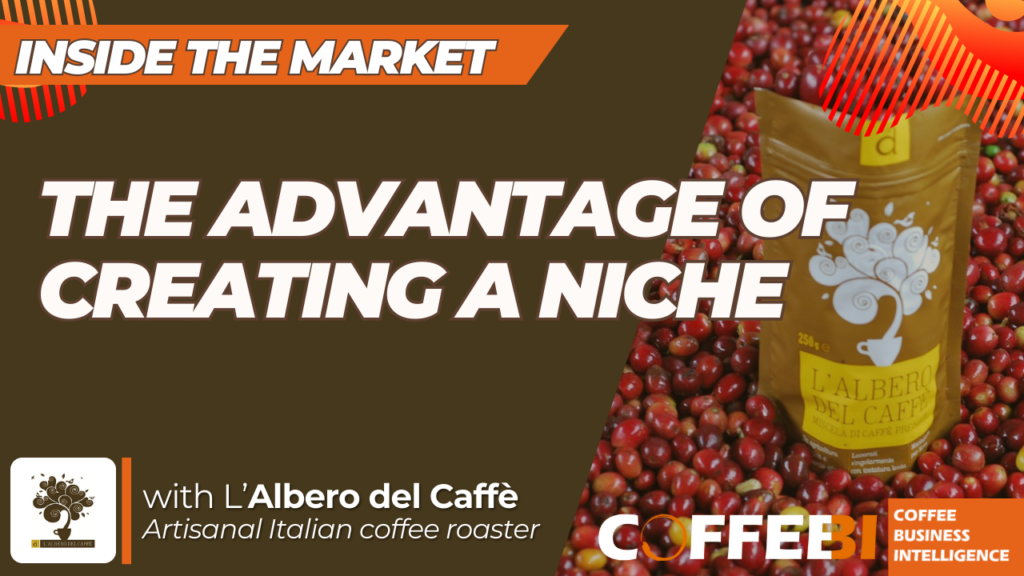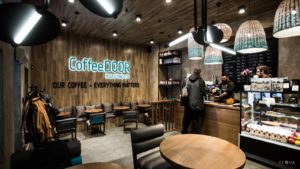The quality of Coffee: the advantage of creating a niche
Inside the Market’ is a miniseries focused on the coffee market, providing firsthand insights from industry operators. In the first episode about the coffee world, the Italian artisanal roasting house ‘L’Albero del caffè‘ discusses turning a commodity into a quality product. It presents its success story as a small enterprise competing with major coffee brands.
- The commodity that becomes culture
- Specialty Coffee: More Than Just Commercial Exchanges
- Quality and Niche: Strategies to Implement
- About HORECA

Coffee is a commodity whose commercial value is determined by the market. However, it also carries an exotic aura as a colonial product, similar to tea and cocoa, and it stimulates the neurosensory system.
Despite being a commodity, coffee has characteristics of great value. It’s no coincidence that societies have created rituals around tea, coffee, and cocoa. These rituals transcend economic exchange and the social norms of production locations. Paradoxically, over time, consumer countries have integrated these foreign products into their own identities and cultures. For instance, tea rituals in the United Kingdom, Russia, Arab countries, China, and Japan.
Today, coffee is a strong symbol of identity for Italy, which has lent its name to one of the most recognizable coffee styles in the world, the Espresso. Similarly, Turkey is known for its classic Turkish coffee.
In essence, coffee embodies complexity and integration in what we call the “first” world.
Specialty Coffee: More Than Just Commercial Exchanges
Coffee often sparks personal interest that goes beyond commodity and turnover. This curiosity can lead to exploration in various fields like geography, geopolitics, botany, and taste.
Ultimately, this journey always ends at one place: quality. Paying attention to quality becomes a personal need, an inner necessity, a way to understand the business rather than merely a business objective.
Specialty coffees account for less than 3% of the world’s coffee, making it a niche market. This isn’t due to a lack of high-quality coffees, but the absence of accurate information guiding consumers towards quality.
This topic is frequently discussed among industry professionals. However, it underscores the complex task of educating the market about the effort and dedication behind high-quality coffee.
Quality and Niche: Strategies to Implement
The concept of quality can be differently perceived by the roaster and the final customer. This presents an opportunity: to become an entity that engages customers by selecting a specific niche and designing a customer identity with recognizable values. This can differentiate the customer from a market that has been dictated by different values for decades.
However, challenges abound, especially when competing with large operators who, with more resources, try to pull the laboriously acquired niche customer back into a mass market, where quality is often compromised for lower purchase costs.
This is a typical risk in a free market, compounded by the fact that in the world of commodities, maintaining quality incurs high costs. These costs can be associated with the price of raw materials, processing, company control procedures, and typically result in lower margins in the final balance.
About HORECA
HoReCa operators are a unique category. For instance, at L’Albero del Caffè, we’ve chosen not to adopt common commercial practices in Italy. These include not providing coffee machines for use, accessories, consumer products or furniture to bars in an “all you can eat” formula.
When an operator’s professionalism allows for a cup that truly expresses the quality of our supply chain, the results are impressive. Customers rarely leave us, especially when they see the commercial returns in terms of satisfied customers, reviews, and turnover.
However, we don’t have a commercial network that brings in new customers. Operators usually find us by word of mouth. When they realize they must independently equip themselves with the equipment, many back out.
If I were to offer advice for the HORECA sector, I’d highlight the four strong points of our roasting house:
- First, the raw material. We treat it with utmost care and appropriate timing, as if it were perishable within the month. Just like a mozzarella, for example. Our entire production is organized in retroplanning, starting from this concept.
- Second, we focus on market niches that align with our history and identity. This enables us to serve not just the product, but also our values. We do this through the stories of the people who cultivate coffee, thanks to our extensive experience as plantation technicians in cooperative projects.
- Third, customer care. We keep our customer base free from excessive communication noise, which we consider a production cost.
- Fourth, personalization. Instead of being a weak operator in a jungle of stronger ones, we’ve identified our weaknesses and aim to address them. The cost of outsourcing for roasting houses that are potential competitors is our second budget item. We offer those quality productions in small quantities with maximum personalization, which a typical roasting house cannot achieve.


